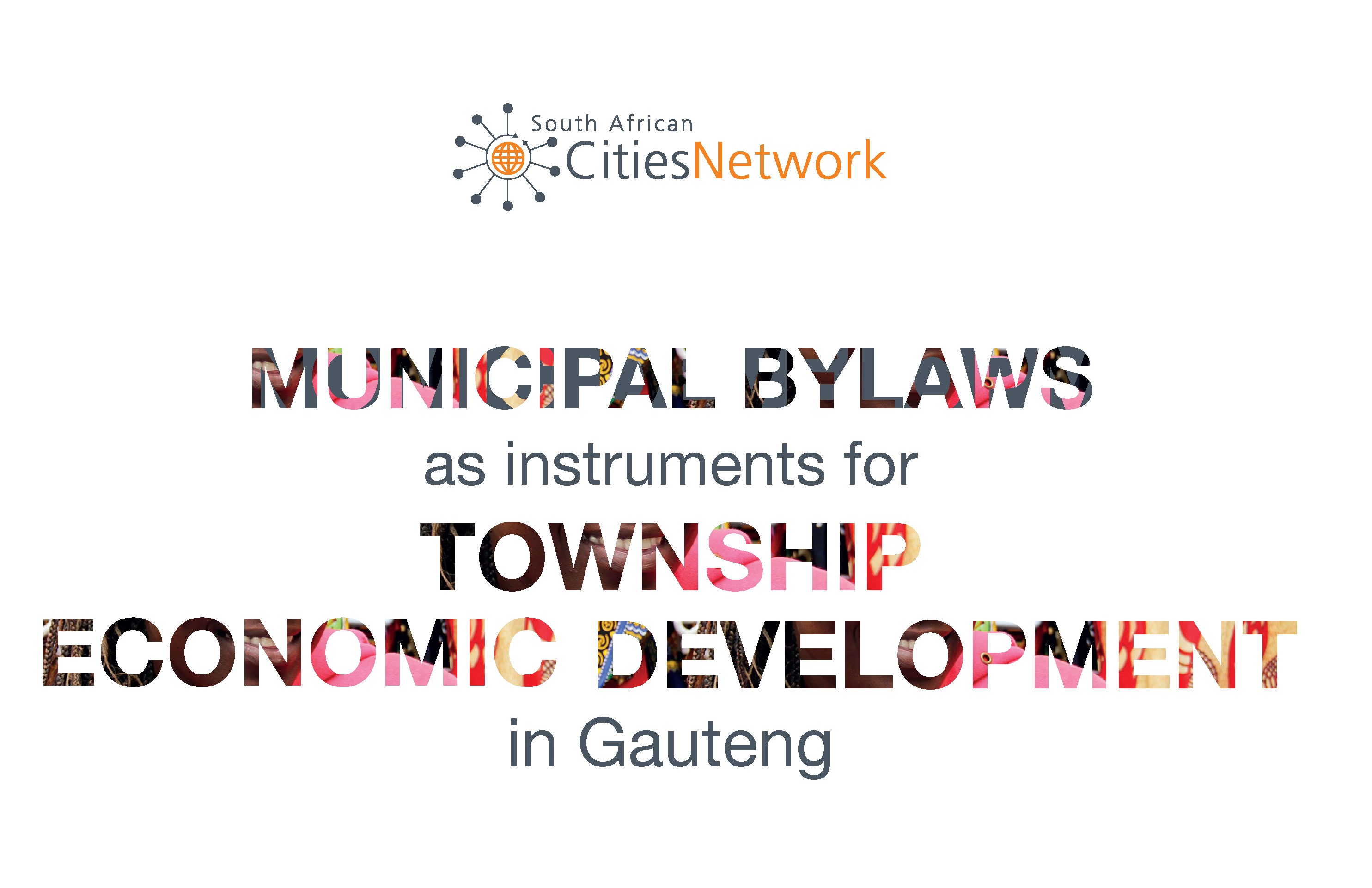Municipal By-laws as Instruments for Township Economic Development in Gauteng

Township economies are complex. They come from a South African history of socially engineered urban growth and marginalisation, macro- and micro-level systems of power and decision-making, and multiple international, African regional, national and local economic and political forces. Formal and informal enterprises and markets based in townships are fast expanding, as is the number of established and emerging (local and foreign) township entrepreneurs. The government and provincial authorities would like to see township economies flourish and make a sustainable contribution to the country’s overall economic growth.
This research paper is the second in a series of two. Both papers are situated in a legal context. The first, titled ‘Township Economic Development in Gauteng Province: National and Provincial Perspectives’ (Research Paper 1), reviews the national and Gauteng provincial legal frameworks, to map the legal landscape pertaining to township economic development, and to identify steps that the Gauteng provincial government is empowered and well-placed to take to revitalise and enable township economic development in the province.
The research points to six possibilities:
- Promulgation of a Gauteng provincial framework Act (i.e. passing provincial law) that clarifies the functional responsibilities of provincial and local government for enabling township economies; lays down principles, norms and standards applicable to township economic development; and requires local government bylaws in the province to be aligned with such national and provincial legislation containing overarching norms, standards and principles;
- Promulgation of standard draft bylaws that municipalities in the province can adapt and adopt;
- Alignment of the Gauteng Spatial Development Framework 2030 with township economic development objectives to inform municipal IDPs and SDFs;
- Establishing dedicated intergovernmental forums and implementation protocols;
- Mining the potential of other (under-utilised or still non-existent) provincial instruments to support township economic development; and
- Passing a Gauteng provincial constitution
Therefore, the Gauteng provincial government could use legal intervention to advance thriving township economies in the province’s cities.
This present research paper draws on the first two possibilities listed above. It concludes the mapping of the legal landscape commenced in Research Paper 1 by reviewing provisions contained in the current bylaws of all municipalities in Gauteng that may impact on township economic development. This review uncovers examples of bylaw provisions that may assist in township economic development, and some that may hinder it. It also provides an overall picture of the extent and uniformity of the local-level regulation of township economic activity in the province, which may inform the content of provincial framework legislation. The authors also question the potential of bylaws, as a form of legal instrument, to contribute to the revitalisation of township economic growth.
In order to thrive, township economic development depends firstly on the capabilities and resilience of township businesses, and an enabling regulatory environment; secondly, on a spatial environment conducive for businesses to flourish and connect; and thirdly, on the promotion of social assets such as inclusive decision-making and participatory governance. The study shows that currently, no Gauteng municipality coherently regulates the township economy with a single, ‘framework’ bylaw. However, quite a few municipalities have a range of sector-specific bylaws that impact on different aspects of township economic activity.
Typical aspects currently regulated by municipal bylaws in Gauteng include street trading, markets, behaviour in public places, and municipal health.
The paper engages specifically with the potential for municipal-level legal reform in township-economy regulations. It analyses:
- the national legal framework for the development and promulgation of municipal bylaws and standard draft bylaws in South Africa;
- a number of existing municipal bylaws and local policies relevant to township economic development in Gauteng;
- enabling measures in bylaws and policies of other metropolitan municipalities in South Africa; and
- municipal bylaws as potential instruments for township economic development in Gauteng.
The research is based on a review of existing laws (including bylaws) and policies, but does not address how this content translates into the everyday regulation of economic activity in townships. The way in which bylaws are interpreted, implemented and enforced by municipal officials can be as supportive or encumbering as their content.
As a next step, bylaw implementation, enforcement and levels of compliance will have to be explored. Comparable municipal case studies could generate valuable information for Gauteng and other provinces.
An important observation: while municipal bylaws have the potential to change the operation of Gauteng’s township economies positively, they may just as easily hinder township economic development, where regulatory provisions are not carefully designed taking into account the necessary capabilities and resilience of township businesses, the spatial environment of townships, and the nature of the social assets in these areas. The inhibiting provisions identified here are typically not unconstitutional or illegal, but they are undesirable from a township economic perspective; they may need to be reformulated or repealed.
The main finding of this paper is that there is scope for the Gauteng Provincial Legislature, the MEC responsible for local government, and the municipalities in the province to undertake a law reform process to ensure that legal frameworks at different levels interact appropriately and assist the revitalisation of the township economy. Reaffirming the findings of Research Paper 1, and in the context of politically divided authority across different municipalities in Gauteng, we believe that two simultaneously pursued legal strategies at provincial level would best serve the interests of township economic development in Gauteng Province:
- the passing of a Gauteng provincial framework law (Act) on township economic revitalisation that sets out appropriate intergovernmental relations, introduces appropriate governing instruments and contains definitions, norms, standards and principles to which existing and future municipal bylaws in the Province are required to adhere; and
- the publication, by the MEC responsible for local government, of different standard draft bylaws (on relevant aspects of township economic development) that reflect the definitions and comply with the norms, standards and principles in the framework legislation, for municipalities in the province to consider adapting or adopting as municipal bylaws, to comply with the provisions of the framework legislation.
For these provincial interventions to have the desired effect, they must be coupled with appropriate local government action. On their own or in compliance with provincial framework legislation, Gauteng’s municipalities should adopt overarching ‘framework municipal bylaws’ regulating local township economies, and supplement and align these with sector-specific bylaws (such as bylaws dealing specifically with street trading, municipal health and public nuisance). Adopting or adapting standard draft bylaws would be a useful (and recommended) way of doing this.
While it focuses on Gauteng Province and is mindful of the variances between township areas, this report speaks to municipalities and provincial authorities across South Africa



Comments